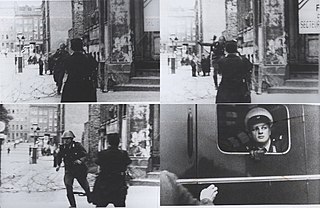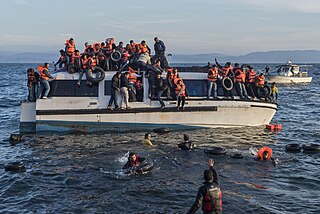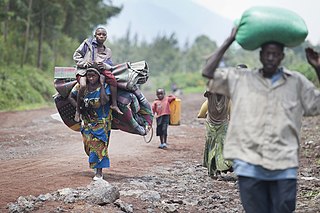Scott Leckie (born 1962) is an international human rights and global housing advocate in the field of economic, social and cultural rights. He established several human rights organisations and remedial institutions.
Scott Leckie (born 1962) is an international human rights and global housing advocate in the field of economic, social and cultural rights. He established several human rights organisations and remedial institutions.
Scott Leckie is the Director of Displacement Solutions, a Geneva-based NGO working to assist people who are displaced from their homes due to conflict or climate change. [1]
Leckie is also Director of Oneness World Foundation, an organisation that identifies practical, peaceful and evolutionary ways to establish a post-nation-state world governed on the basis that all humans are equal citizens of Earth, rather than exclusively citizens of individual nation-states. [2]
Leckie founded the Centre on Housing Rights and Evictions (COHRE) and was Executive Director from 1991 to 2007. [3]
He has worked with the Centre for Human Settlements of the University of British Columbia, the Panos Institute, the International Institute for Environment and Development (IIED) and the Netherlands Institute of Human Rights (SIM).
From 1989 to 1999 he acted as Legal Counsel and United Nations Representative for Habitat International Coalition.
He was born in Los Angeles, California and holds citizenship in the Netherlands. He resides in Australia.
The Office of the United Nations High Commissioner for Refugees (UNHCR) is a United Nations agency mandated to aid and protect refugees, forcibly displaced communities, and stateless people, and to assist in their voluntary repatriation, local integration or resettlement to a third country. It is headquartered in Geneva, Switzerland, and has 20,305 staff working in 136 countries as of December 2023.

The International Organization for Migration (IOM) is a United Nations related organization working in the field of migration. The organization implements operational assistance programmes for migrants, including internally displaced persons, refugees, and migrant workers.

The United Nations Interim Administration Mission in Kosovo is the officially mandated mission of the United Nations in Kosovo. The UNMIK describes its mandate as being to "help the United Nations Security Council achieve an overall objective, namely, to ensure conditions for a peaceful and normal life for all inhabitants of Kosovo and advance regional stability in the Western Balkans."

A refugee, according to the United Nations High Commissioner for Refugees (UNHCR), is a person "forced to flee their own country and seek safety in another country. They are unable to return to their own country because of feared persecution as a result of who they are, what they believe in or say, or because of armed conflict, violence or serious public disorder." Such a person may be called an asylum seeker until granted refugee status by a contracting state or by the UNHCR if they formally make a claim for asylum.

An internally displaced person (IDP) is someone who is forced to leave their home but who remains within their country's borders. They are often referred to as refugees, although they do not fall within the legal definitions of a refugee.

A refugee camp is a temporary settlement built to receive refugees and people in refugee-like situations. Refugee camps usually accommodate displaced people who have fled their home country, but camps are also made for internally displaced people. Usually, refugees seek asylum after they have escaped war in their home countries, but some camps also house environmental and economic migrants. Camps with over a hundred thousand people are common, but as of 2012, the average-sized camp housed around 11,400. They are usually built and run by a government, the United Nations, international organizations, or non-governmental organization. Unofficial refugee camps, such as Idomeni in Greece or the Calais jungle in France, are where refugees are largely left without the support of governments or international organizations.

Forced displacement is an involuntary or coerced movement of a person or people away from their home or home region. The UNHCR defines 'forced displacement' as follows: displaced "as a result of persecution, conflict, generalized violence or human rights violations".
Economic, social and cultural rights (ESCR) are socio-economic human rights, such as the right to education, right to housing, right to an adequate standard of living, right to health, victims' rights and the right to science and culture. Economic, social and cultural rights are recognised and protected in international and regional human rights instruments. Member states have a legal obligation to respect, protect and fulfil economic, social and cultural rights and are expected to take "progressive action" towards their fulfilment.
In 2008 there were about 500-700 Romani people in Mitrovica refugee camps. These three camps were created by the UN in Kosovo. The camps are based around disused heavy metals mines which have fallen out of use since the end of the Kosovo War of 1999. There have been complaints that the residents are suffering severe lead poisoning. According to a 2010 Human Rights Watch, Romani displaced from the Romani quarter in Mitrovica, due to its destruction in 2000, continued to be inmates of camps in north Mitrovica, where they were exposed to environmental lead poisoning.
The Kosovo Property Agency (KPA) was established on 4 March 2006 under United Nations Interim Administration Mission in Kosovo (UNMIK) Regulation 2006/10, as an administrative agency functioning independently pursuant to Chapter 11.2 of the Constitutional Framework of Kosovo. It is mandated under UNMIK Regulation 2006/50 to resolve the resolution of claims resulting from the armed conflict that occurred between 27 February 1998 and 20 June 1999 in respect of private immovable property, including agricultural and commercial property - and has three main functions; (a) receive, register and resolve specific claims on private immovable property; (b) enforcement of legally final decisions; and (c) administration of abandoned properties. The KPA has, subject to appeal to the Supreme Court of Kosovo, exclusive jurisdiction to resolve the claims for private immovable property resulting from the conflict period specified above.
Cypriot refugees are the Cypriot nationals or Cyprus residents who had their main residence in an area forcibly evacuated during the Cyprus conflict. The government of Cyprus also recognizes as refugees the descendants of the original refugees in the male line regardless of place of birth.
The Norwegian Refugee Council is a humanitarian, non-governmental organisation that protects the rights of people affected by displacement. This includes refugees and internally displaced persons who are forced to flee their homes as a result of conflict, human rights violations and acute violence, as well as climate change and natural disasters.

The International Catholic Migration Commission (ICMC) is an international organization that serves and protects uprooted people, including migrants, refugees, and internally displaced people, regardless of faith, race, ethnicity or nationality. With staff and programs in over 40 countries, ICMC advocates for sustainable solutions and rights-based policies directly and through a worldwide network of 132 member organizations.
Bruno Geddo is an Italian national, born in Novara in 1959. He has served with the United Nations High Commissioner for Refugees (UNHCR) for over 30 years in Sub-Saharan Africa, North Africa and the Middle East.
The Centre on Housing Rights and Evictions (COHRE) was a Geneva-based international non-governmental organisation founded in 1994 by Scott Leckie as a foundation in the Netherlands.
The United Nations High Commissioner for Refugees Representation in Cyprus is an office of the United Nations High Commissioner for Refugees (UNHCR) opened in August 1974 upon the request of the Government of Cyprus and the Secretary-General of the United Nations. UNHCR Representation in Cyprus was designated as Coordinator of the United Nations Humanitarian Assistance for Cyprus. UNHCR was also responsible upon the request of the Cyprus Government to examine applications for refugee status.

The Kampala Convention is a treaty of the African Union (AU) that addresses internal displacement caused by armed conflict, natural disasters and large-scale development projects in Africa.
Refugees of the Syrian civil war are citizens and permanent residents of Syria who fled the country in the course of the Syrian civil war. The pre-war population of the Syrian Arab Republic was estimated at 22 million (2017), including permanent residents. Of that number, the United Nations (UN) identified 13.5 million (2016) as displaced persons in need of humanitarian assistance. Since the start of the Syrian civil war in 2011 more than six million (2016) were internally displaced, and around five million (2016) crossed into other countries, seeking asylum or placement in Syrian refugee camps. It is believed to be one of the world's largest refugee crises.
A refugee crisis can refer to difficulties and dangerous situations in the reception of large groups of forcibly displaced persons. These could be either internally displaced, refugees, asylum seekers or any other huge groups of migrants.

Palestinian displacement in East Jerusalem is the transfer of Palestinian residents from the city due to Israeli policies aimed at an Israeli-Jewish demographic majority. Many Palestinian families in East Jerusalem have been affected by "forced relocation processes or been involved in lengthy legal procedures to revoke an eviction order." According to the United Nations Office for the Coordination of Humanitarian Affairs (OCHA), between a third to a half of East Jerusalem's houses do not have permits, potentially placing over 100,000 Palestinian residents of the city at risk of forced displacement and forcible transfer as a result of demolitions.
{{cite journal}}: CS1 maint: year (link)